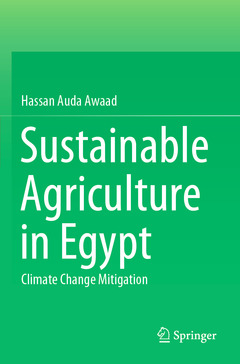Sustainable Agriculture in Egypt, 1st ed. 2022 Climate Change Mitigation

This book has been prepared and supported by recent references and statistics with coloured tables and illustrations for audiences interested in crop science,environment, plant breeding, genetics and biotechnology, as well as postgraduate students and researchers in universities and research centres.
Part I: Introduction
Introduction to “Crop Productivity, Biotechnology and Climate Change: Vulnerability, Adaptation, Stability and Mitigation Potentials from Case-Studies in Egypt
Part II: Impact of Climate Change on Crop Production and the Physiological and Biochemical Basis for Crops Tolerance
Climate Change and its Impact on Crop Production
Foundations of Crop Tolerance to Climate Change:
Plant Traits Relevant to Stress Tolerance
Part III: Case Studies: Improve Crop Adaptability and Stability to Climate Change and Modern Technology
Approaches in Wheat to Mitigate Impact of Climate Change
Approaches in Faba bean to Mitigate Impact of Climate Change
Approaches in Sesame to Mitigate Impact of Climate Change
Approaches in Sunflower to Mitigate Impact of Climate Change
Approaches in Cotton to Mitigate Impact of Climate Change
Part IV: Conclusions and Recommendations
Update, Conclusions and Recommendations of “Crop Productivity, Biotechnology and Climate Change
Provides insights into understanding field crop responses to climate change
Presents in-depth case studies on wheat, faba bean, sesame, sunflower and cotton crops
Focuses on different approaches represented by genetic systems of morpho-physiological traits
Date de parution : 09-2022
Ouvrage de 320 p.
15.5x23.5 cm
Disponible chez l'éditeur (délai d'approvisionnement : 15 jours).
Prix indicatif 105,49 €
Ajouter au panierDate de parution : 09-2021
Ouvrage de 320 p.
15.5x23.5 cm



